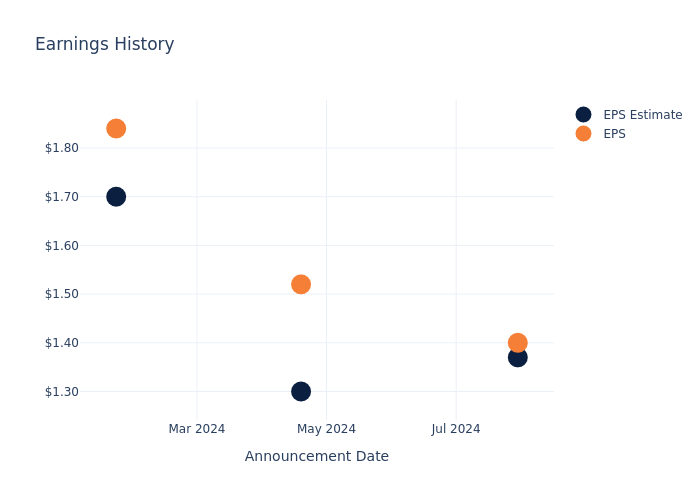
Procter & Gamble PG is set to give its latest quarterly earnings report on Friday, 2024-10-18. Here’s what investors need to know before the announcement.
Analysts estimate that Procter & Gamble will report an earnings per share (EPS) of $1.90.
Investors in Procter & Gamble are eagerly awaiting the company’s announcement, hoping for news of surpassing estimates and positive guidance for the next quarter.
It’s worth noting for new investors that stock prices can be heavily influenced by future projections rather than just past performance.
Performance in Previous Earnings
In the previous earnings release, the company beat EPS by $0.03, leading to a 0.58% drop in the share price the following trading session.
Here’s a look at Procter & Gamble’s past performance and the resulting price change:
| Quarter | Q4 2024 | Q3 2024 | Q2 2024 | Q1 2024 |
|---|---|---|---|---|
| EPS Estimate | 1.37 | 1.30 | 1.70 | 1.71 |
| EPS Actual | 1.40 | 1.52 | 1.84 | 1.83 |
| Price Change % | -1.0% | 1.0% | -1.0% | -1.0% |

Stock Performance
Shares of Procter & Gamble were trading at $172.38 as of October 16. Over the last 52-week period, shares are up 16.58%. Given that these returns are generally positive, long-term shareholders are likely bullish going into this earnings release.
Analyst Opinions on Procter & Gamble
For investors, grasping market sentiments and expectations in the industry is vital. This analysis explores the latest insights regarding Procter & Gamble.
Analysts have provided Procter & Gamble with 14 ratings, resulting in a consensus rating of Neutral. The average one-year price target stands at $172.64, suggesting a potential 0.15% upside.
Peer Ratings Overview
In this analysis, we delve into the analyst ratings and average 1-year price targets of Colgate-Palmolive, Kimberly-Clark and Church & Dwight Co, three key industry players, offering insights into their relative performance expectations and market positioning.
- The consensus outlook from analysts is an Buy trajectory for Colgate-Palmolive, with an average 1-year price target of $107.07, indicating a potential 37.89% downside.
- Analysts currently favor an Neutral trajectory for Kimberly-Clark, with an average 1-year price target of $145.0, suggesting a potential 15.88% downside.
- Church & Dwight Co is maintaining an Underperform status according to analysts, with an average 1-year price target of $101.71, indicating a potential 41.0% downside.
Analysis Summary for Peers
The peer analysis summary offers a detailed examination of key metrics for Colgate-Palmolive, Kimberly-Clark and Church & Dwight Co, providing valuable insights into their respective standings within the industry and their market positions and comparative performance.
| Company | Consensus | Revenue Growth | Gross Profit | Return on Equity |
|---|---|---|---|---|
| Procter & Gamble | Neutral | -0.10% | $10.18B | 6.20% |
| Colgate-Palmolive | Buy | 4.89% | $3.07B | 414.16% |
| Kimberly-Clark | Neutral | -2.05% | $1.81B | 49.91% |
| Church & Dwight Co | Underperform | 3.92% | $712.10M | 5.79% |
Key Takeaway:
Procter & Gamble ranks at the bottom for Revenue Growth among its peers. It is in the middle for Gross Profit. For Return on Equity, it is at the bottom.
Delving into Procter & Gamble’s Background
Since its founding in 1837, Procter & Gamble has become one of the world’s largest consumer product manufacturers, generating more than $80 billion in annual sales. It operates with a lineup of leading brands, including more than 20 that generate north of $1 billion each in annual global sales, such as Tide laundry detergent, Charmin toilet paper, Pantene shampoo, and Pampers diapers. Sales outside its home turf represent more than half of the firm’s consolidated total.
Key Indicators: Procter & Gamble’s Financial Health
Market Capitalization Analysis: With an elevated market capitalization, the company stands out above industry averages, showcasing substantial size and market acknowledgment.
Negative Revenue Trend: Examining Procter & Gamble’s financials over 3 months reveals challenges. As of 30 June, 2024, the company experienced a decline of approximately -0.1% in revenue growth, reflecting a decrease in top-line earnings. As compared to its peers, the revenue growth lags behind its industry peers. The company achieved a growth rate lower than the average among peers in Consumer Staples sector.
Net Margin: Procter & Gamble’s financial strength is reflected in its exceptional net margin, which exceeds industry averages. With a remarkable net margin of 14.91%, the company showcases strong profitability and effective cost management.
Return on Equity (ROE): Procter & Gamble’s ROE falls below industry averages, indicating challenges in efficiently using equity capital. With an ROE of 6.2%, the company may face hurdles in generating optimal returns for shareholders.
Return on Assets (ROA): Procter & Gamble’s ROA surpasses industry standards, highlighting the company’s exceptional financial performance. With an impressive 2.53% ROA, the company effectively utilizes its assets for optimal returns.
Debt Management: Procter & Gamble’s debt-to-equity ratio is below the industry average. With a ratio of 0.67, the company relies less on debt financing, maintaining a healthier balance between debt and equity, which can be viewed positively by investors.
To track all earnings releases for Procter & Gamble visit their earnings calendar on our site.
This article was generated by Benzinga’s automated content engine and reviewed by an editor.
© 2024 Benzinga.com. Benzinga does not provide investment advice. All rights reserved.



